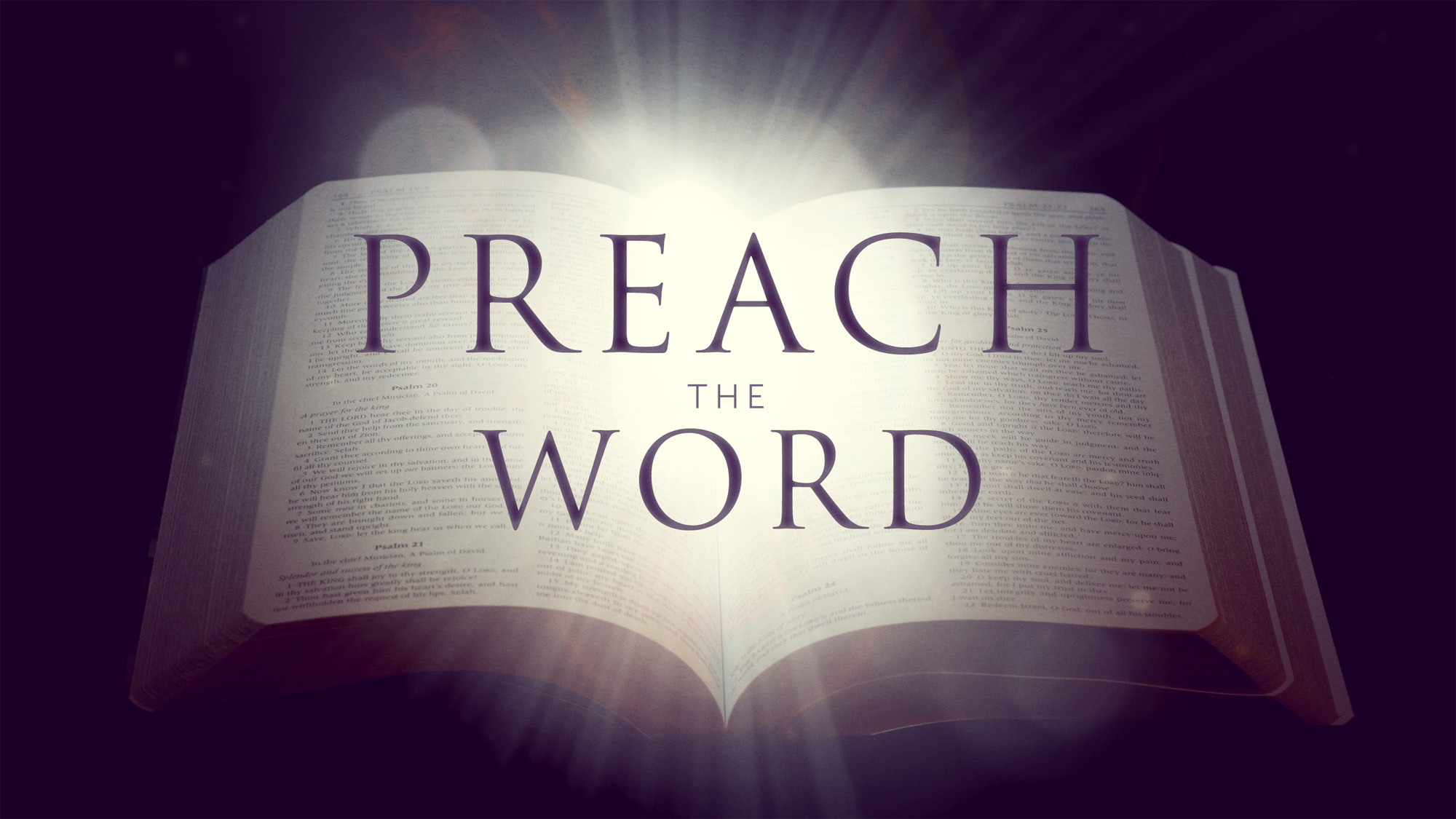Have you ever heard someone say, "Preach!" in a conversation and wondered what they actually meant? You know, it's a word that usually makes you think of a speaker at a church, someone giving a very serious talk. But, like, in everyday chat, it can mean something very different, too. This shift in how we use words is quite interesting, and it happens all the time with language.
The original meaning of "preach" is quite clear, as a matter of fact. It's about delivering a sermon, or giving a religious speech, especially if you are a priest or a minister in a church. It also means to advocate for something, like a moral truth or good conduct, either by speaking or writing. You might give earnest advice, too, on subjects that are quite serious, like religion or morals. When people preach a belief, they are trying to persuade others to accept it, or to take a certain course of action. He tried to preach peace and tolerance to his people, for example.
But then, there's the slang use, which is a bit of a twist, isn't it? This newer way of using the word, "preach slang," shows how language changes and adapts, you know, to fit how people talk now. It's a sign of how words can keep their core idea but get a whole new feel in different situations. It's really quite common for words to do that.
Table of Contents
- What is "Preach Slang"?
- The Roots of "Preach": A Quick Look
- Why Do Words Like "Preach" Change Their Meaning?
- How "Preach Slang" Works in Conversation
- When to Use and When to Skip "Preach Slang"
- The Impact of Slang on How We Talk
- Frequently Asked Questions About "Preach Slang"
- Looking Ahead for "Preach Slang"
What is "Preach Slang"?
So, when someone says "preach" as slang, they are almost always expressing strong agreement, you know, with something someone just said. It's like saying, "Yes, that's so true!" or "You got it!" or "Exactly!" It's a way to show you really connect with a statement, especially if it feels like a powerful or very accurate observation. It's often used when someone states something that is very obvious, or perhaps a widely accepted truth, but said with a bit of feeling. You might hear it, for instance, when a friend shares a common frustration, and you feel that, too.
This use of "preach" doesn't have anything to do with religion, really, or giving a long speech. It's much more about a quick, heartfelt acknowledgment. It's a verbal nod, a way to say, "I hear you, and I completely agree." It’s quite a common thing, especially among younger people, but it has spread a bit, too, across different age groups. It's a casual way to communicate a strong feeling of shared understanding, you know, in a quick moment.
The Roots of "Preach": A Quick Look
To really get "preach slang," it helps to look at where the word "preach" comes from, just a little. Its origins are very much tied to religious settings, which is, you know, the first thing most people think of. This background gives the slang its unique flavor, even if the meaning has moved quite far from it. It's almost like the slang version carries a little echo of the original power.
The Traditional Sense
The meaning of "preach" is, at its core, to deliver a sermon. This often refers to a religious leader, like a priest or pastor, giving a speech to a group of people, generally in a church during a service. It's about giving a religious talk in a public place, as a matter of fact. It means to proclaim or put forth a message in a sermon, or to give earnest advice on moral subjects. You may go to church to hear the minister preach, or you might preach tolerance to your friends. It's about advocating for something, urging acceptance or compliance with an idea, perhaps peace and tolerance.
This traditional use emphasizes the idea of a message being delivered with conviction, you know, with a lot of belief behind it. It's about teaching doctrine or exhorting people to live in a certain way. The word suggests a certain authority, too, or a strong desire to influence others. It's a very active word in this sense, really, about putting ideas out there for others to take in. It's a powerful way to communicate.
The Biblical Context
In the biblical context, preaching refers to the act of delivering a message from God. This often involves the proclamation of the gospel, which is, you know, the good news, teaching of doctrine, and urging people to live according to God's ways. It's about publicly proclaiming or teaching a religious message or belief. This is a very old and very significant use of the word, too, shaping how many people think about it. It’s a very formal kind of message delivery, really, with deep meaning.
So, you see, the word "preach" has a history of being used for very important, impactful messages. It's about speaking with authority, with truth, and with a goal to persuade or teach. This background, perhaps, is why the slang version feels so strong. It takes that sense of undeniable truth and applies it to everyday observations, almost like saying, "That's a truth so profound, it could be a sermon." It's quite clever, in a way.
Why Do Words Like "Preach" Change Their Meaning?
Language is always moving, you know, always changing. Words pick up new meanings because people use them in new ways, and those new uses catch on. It's a very organic process, really. Think about it: a word gets used in a slightly different context, and if enough people understand that new context, it becomes a part of how we talk. This is how slang often comes about, actually. It's a natural thing for words to do.
For "preach," the shift likely happened because the original meaning carries a sense of delivering a powerful, undeniable truth. When someone says something very insightful or spot-on, it feels like they are "preaching" a truth, even if it's not religious. The intensity of the original word lends itself well to expressing strong agreement. It's a bit like taking the feeling of a sermon's impact and applying it to a casual statement. It's a pretty common way words evolve, too, keeping a bit of their old feeling in their new meaning.
How "Preach Slang" Works in Conversation
So, how do people actually use "preach slang" in real conversations? It's pretty straightforward, but understanding the nuances can help you use it yourself, or just understand it better when you hear it. It's mostly an exclamation, a short, sharp burst of agreement. It’s not usually part of a longer sentence, you know, just a quick response. It’s quite effective for showing immediate reaction.
Agreeing with Feeling
This is probably the most common way you'll hear "preach" used as slang. Someone says something, and you feel it deep down, you know? Like, if a friend says, "I'm so tired of these long meetings that could have been emails," you might just respond with, "Preach!" It means you totally get it, and you feel the same way, too. It's a way to show solidarity, actually, and shared frustration or understanding. It’s a very quick way to connect.
It's a very strong form of agreement, stronger than just saying "yes" or "I agree." It adds a layer of emotional resonance, almost like saying, "You've spoken a truth that needed to be heard!" It's quite an emphatic response, really. It’s a way to make your agreement feel bigger. So, it's not just about agreeing, it's about agreeing with conviction, too.
Calling Out Truth
Sometimes, "preach" is used when someone states something that is universally true, or at least, true for a lot of people, but perhaps not often said out loud. Imagine someone saying, "It's really hard to balance work and personal life sometimes." You might say, "Preach!" because that's a truth many people experience, you know, but don't always articulate. It's about acknowledging a shared reality, too, that feels very real.
This use highlights the idea of a statement being very insightful or profound, even if it's a simple observation. It's like the speaker has articulated something that was just floating in the air, and you're confirming its validity. It gives the original statement a bit more weight, actually, by showing how much it resonates. It’s a way to validate someone’s point.
Showing Support
In some cases, "preach" can also be a way to show support for someone's opinion or stance, especially if they are expressing something bold or perhaps a bit controversial. If someone says, "We need to stand up for what's right, even when it's hard," you might respond with "Preach!" This shows you're on their side, and you believe in what they are saying, too. It’s a bit like cheering them on, actually, for their conviction.
It's a quick way to affirm someone's message and encourage them to keep speaking their mind. It’s a very positive response, you know, when someone is making a point they feel strongly about. It tells them, "Keep going, you're saying something important." It’s quite a supportive word, really, in this context. So, it’s not just agreement, but also encouragement.
When to Use and When to Skip "Preach Slang"
Knowing when to use "preach slang" is pretty important, you know, to make sure you're understood and don't sound out of place. It's a casual term, so it fits best in informal settings. Think about talking with friends, family, or people you know well. It’s a bit like wearing casual clothes; there are times and places for them, and times when something more formal is better. It's all about context, really.
You probably wouldn't use "preach" as slang in a formal business meeting, for example, or when talking to someone in a position of authority for the first time. It might come across as unprofessional or even a bit disrespectful, because of its casual nature. It’s also probably not the best choice in very serious or solemn situations, where the traditional meaning of "preach" might be more relevant, and the slang could cause confusion. So, always consider your audience, too, and the situation you are in. It’s quite a good rule for all communication.
It's also worth remembering that while "preach slang" is pretty common now, not everyone might be familiar with it, especially older generations or people from different cultural backgrounds. If you're not sure, it's always safer to stick to more universally understood phrases like "I agree," "That's so true," or "Exactly." You know, clarity is often the best policy, actually, especially when you want to be sure your message lands right. It’s a simple way to avoid any misunderstandings.
The Impact of Slang on How We Talk
Slang words, like "preach," play a very big part in how language grows and changes. They often make conversations more lively and expressive. They allow for quick, concise communication of complex feelings or agreements. It’s a bit like a shortcut, actually, for getting a point across fast. This kind of language makes our daily chats feel more personal, too, and more connected. It’s a very human way to speak.
They can also create a sense of belonging among groups of people who use the same slang. It’s like an inside language, you know, that signals you are part of a particular community or generation. This shared vocabulary can strengthen bonds and make communication feel more natural and fluid. However, this also means that slang can sometimes exclude those who don't understand it, creating barriers. So, it's a bit of a double-edged sword, really, for communication. It has both good points and some challenges, too.
The rise of "preach slang" shows how language is always adapting to fit the needs of its speakers. It takes an old word with a lot of weight and gives it a new, lighter, but still powerful, purpose. It's a living thing, language, always moving and shifting. So, the next time you hear someone say "preach!" in a casual chat, you'll know exactly what they mean, and you might even feel like saying it yourself. Learn more about language evolution on our site, and link to this page the history of slang for more insights.
Frequently Asked Questions About "Preach Slang"
People often have questions about how slang works, especially when a word changes its meaning so much. Here are a few common ones about "preach slang," you know, that might pop up.
Is "preach" as slang rude or disrespectful?
Generally, no, it's not rude at all. When used in casual conversation among friends or people who understand modern slang, "preach" is a sign of strong agreement and support. It shows you really connect with what someone is saying. However, using it in very formal settings or with people who might not understand slang could be seen as out of place, or perhaps a bit informal. It's all about knowing your audience, you know, and the situation. It’s quite important to think about that.
Can I use "preach" slang in writing, like texts or social media?
Absolutely, you can! "Preach" as slang is very common in informal writing, especially in text messages, social media comments, and online chats. It fits right in with the casual tone of these platforms. It's a quick and easy way to show agreement or support without writing a long sentence. So, yes, it's a very good fit for those kinds of places, too. It’s quite a popular thing to do online.
Where did the slang meaning of "preach" come from?
The exact origin of slang terms is often hard to pinpoint, you know, as they evolve organically within communities. For "preach," it likely comes from the traditional meaning of delivering a powerful, truthful message. The slang simply takes that sense of undeniable truth and applies it to everyday observations or statements that resonate deeply with someone. It's a natural linguistic evolution, really, that happens over time. It’s quite interesting how words shift like that.
Looking Ahead for "Preach Slang"
The way we use "preach slang" today, in early , shows how dynamic language can be. It's a clear example of how words take on new life and meaning, you know, moving beyond their original definitions to fit new communication needs. This word, "preach," has a very rich history, from solemn sermons to casual affirmations of truth. It's quite a journey for a word, really. It shows how people shape language to make it their own, too.
As time goes on, some slang terms fade away, while others become so common they are eventually added to dictionaries as standard usage. It's hard to say what the future holds for "preach slang," but for now, it's a very active part of how many people talk. It's a simple, powerful way to say, "I agree with that truth!" It’s a very current way to express yourself, too. You can find more information on language trends on a reputable linguistics resource.



Detail Author:
- Name : Mrs. Syble O'Kon
- Username : maggio.dave
- Email : kub.haylie@hotmail.com
- Birthdate : 1976-11-26
- Address : 897 Keshaun Vista Suite 261 Port Geovanni, NE 66463
- Phone : 929-814-8332
- Company : Wiza and Sons
- Job : Astronomer
- Bio : Aliquam libero vitae voluptatem non ipsam. Sit omnis cum unde. Ut atque voluptate ut non vero et.
Socials
twitter:
- url : https://twitter.com/jules_dev
- username : jules_dev
- bio : Eum ut accusamus qui ea. Iure facilis consequatur placeat. Fuga voluptatem quia assumenda.
- followers : 1802
- following : 2637
instagram:
- url : https://instagram.com/jules7120
- username : jules7120
- bio : Hic porro mollitia vero eos omnis aut optio. Quo voluptatem corporis deleniti.
- followers : 6294
- following : 2832
tiktok:
- url : https://tiktok.com/@jschiller
- username : jschiller
- bio : Consequuntur eveniet voluptate est ut sapiente laudantium aliquid.
- followers : 4694
- following : 446
linkedin:
- url : https://linkedin.com/in/jules6418
- username : jules6418
- bio : Quo alias eum unde id porro voluptatibus est.
- followers : 1752
- following : 825
facebook:
- url : https://facebook.com/schillerj
- username : schillerj
- bio : Ut adipisci nihil laboriosam nostrum cumque ut amet et.
- followers : 1490
- following : 2723

